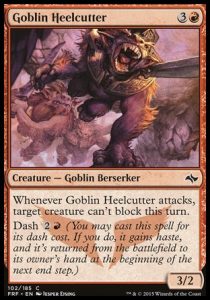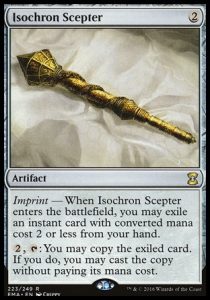Things that Affect Costs & Payments
(Delve, Convoke, Cast for Free, Additional Costs)
To begin this discussion, let’s start all the way at the beginning. During the steps of Casting a Spell, there’s a step where you calculate the costs for your spell. How do you calculate the costs for a spell during this step?
- Brian Rapp
summed it up very well: Take the established mana cost or alternative cost (flashback, cast without paying mana) then add any additional costs, then subtract any cost reducers. Then, look around for an untapped Trinisphere, or anything that sets a cost minimum.
After you determine what the cost of a spell is, and activate all the mana abilities you need, what’s the next step in the process of casting a spell?
- You pay all costs. Remember you can choose any order in which you pay costs, but you cannot do partial payments of a particular type – it’s all or nothing!
Now that you know that process, let’s start throwing some curveballs in there. How does Convoke effect the total cost of the spell?
- It doesn’t. Convoke allows you to pay for any colored mana in the spell’s mana cost by tapping a creature of the same color, and allows you to pay for any generic mana in the mana cost by tapping any creature. It’s considered an alternate method of payment for the cost of a spell, but does NOT count as a cost reduction. Props to Mike Anderson
for spotting this distinction. It’s important to note, the tapping of creatures does not happen during the activation of mana abilities – as the tapping does not generate mana. Tapping the creature specifically can PAY for a mana in the cost of the convoke spell, and therefore is done when in the step of casting a spell where you pay for the cost. (CR 702.50a)
How about Delve? That’s the same right?
- Well, no. As Mark Mason
explained, delve means that for every generic mana in a spell’s mana cost, you may exile a card from your graveyard instead of paying that mana. It cannot affect the colored mana like Convoke does. It does however use similar rules, in that exiling a card from your graveyard is a payment and done during the time when you’d be paying for the spell. (CR 702.65a)
Are Convoke and Delve considered alternative costs?
- No. Convoke and Delve are static abilities of a card that functions while on the stack, allowing you to pay for the spell in a different way. It’s not considered an Alternate casting cost.
What are examples of Alternate Costs? Can you name all the keyworded ones?
 Awaken, Bestow, Dash, Emerge, Evoke, Flashback, Madness, Miracle, Overload, Prowl, Surge
Awaken, Bestow, Dash, Emerge, Evoke, Flashback, Madness, Miracle, Overload, Prowl, Surge- How to identify: “You may {action} instead of paying {mana cost}”
- It’s easy to confuse Alternate Costs with abilities that set up alternate costs. For example, Cascade is a triggered ability that when it resolves grants an alternative casting cost to a revealed card from your library. Suspend is a Special Action that allows you to exile a card from your hand with time counters, sets up delayed triggers for removing Time Counters from the suspended card, and then once the last time counter is removed, then grants you an alternate casting cost of casting the spell without paying its mana cost. Rebound similarly exiles a card as it resolves and allows you to cast it at the beginning of your next turn’s upkeep.
- Morph is another ability that uses the rules for Alternate Casting Costs in allowing you to cast a spell face-down for (3), but the Morph Ability is actually a static ability that grants you the ability to cast the card face-down, as well as activating the morph ability by revealing the card to have the Morph ability and turning it face-up. (CR 702.36a & 702.36c)
Where does “Without paying the spell’s mana cost” fit in with all this? Is it an alternate casting cost like Flashback / Miracle / Dash, or an alternate way to pay for the spell like Delve / Convoke / Improvise? Is it a cost reducer that brings the cost of the spell to 0?
- It’s an alternative cost, replacing the mana cost of the spell with nothing.
- It is NOT a cost reducer, instead, it sets the mana cost of the spell to “Nothing” which ends up being 0. During calculating the cost of a spell spell, you take the set cost of the spell which is either the printed mana cost, or any alternate casting cost (including Without paying its mana cost making the set cost 0) and then run through the addition and subtraction steps, followed by trinisphere which generally wrecks your plans of casting a spell for free.
- It’s to be noted, that using alternate casting costs / adding taxes or Trinisphere minimum requirements does NOT change the CMC of a card. The CMC of a Force of Will is still 5.
So what if you cast a Shardless Agent and cascade into an Ancestral Vision, and there’s a Thalia, Guardian of Thraben on the battlefield?
- While some may think that “Without paying it’s mana cost” means that any additional mana costs may be included, that’s not the case.
- Remember that “Without Paying its Mana Cost” sets the initial mana cost of the spell to Nothing, or 0. You then add any additional costs (Thalia’s tax) and any cost reductions (remember that Without Paying it’s Mana Cost isn’t a reduction!!) and you’ll have to pay (1) for that Ancestral Vision you hit off of Cascade. Kudos to Clint Herron
for this answer.
- Note, if you cascade into a spell with an alternate casting cost, like Part the Waterveil with Awaken, you won’t be able to pay its Awaken cost as it is an alternate casting cost, and casting without paying its mana cost is also an alternate casting cost. You can only ever choose 1 alternate casting cost to use. No Flashbacking an Awaken Spell for its Awaken cost with your Snapcaster Mage!
OK, so about additional costs, how do additional costs factor in with Copying a spell?
 This depends on one thing – whether you’re actually CASTING the copy of the spell, or if you’re simply COPYING and putting the copy directly onto the stack.
This depends on one thing – whether you’re actually CASTING the copy of the spell, or if you’re simply COPYING and putting the copy directly onto the stack. - An example of how additional costs factor in with casting a copy of a spell would be Altar’s Reap on an Isochron Scepter. Each time you cast Altar’s Reap, it will require the additional cost of sacrificing a creature.
- An example of copies of a spell going straight onto the stack includes casting a Tormenting Voice with Pyromancer’s Goggles. The ability of the R mana spent from Pyromancer’s Goggles puts a copy on the stack of the spell that was cast, including its additional cost of discarding. The copy just exists, and doesn’t need additional costs to be put on the stack, as it’s not being cast. Another example of spells being put directly on the stack are things like Storm triggered spells – those don’t increase your storm count, they simply add to the stack after the Storm ability resolves.
Further reading:
-Additional and optional costs, paying costs, calculating costs: CR 117
-Casting a spell: CR 601
-Keyworded abilities, including delve, convoke, etc.: CR 702
Related articles
–How to cast a spell
–Converted mana costs
